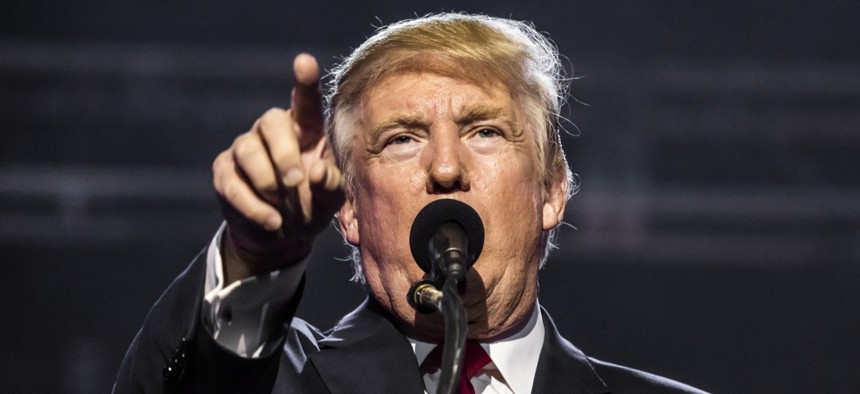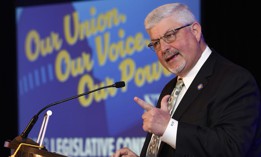At first, OTF was just a program within Radio Free Asia. Last year, with the blessing of Congress and the White House’s Office of Management and Budget, it was spun off to become an independent nonprofit, with government funding and with the ambition to work with the private sector too. Liu told me that RFA’s information services, plus her anti-censorship tools, are “the sharp end of the stick. We hit the Chinese Communist Party where it hurts most, in their country.” The Chinese embassy in Washington is said to refer to Liu, a Chinese American, as a “blood traitor,” and no wonder: Very few people have helped so many Chinese citizens see through their government’s lies.
Chinese disinformation is suddenly a fashionable topic in Washington. Just this month, Secretary of State Mike Pompeo declared that China was using “disinformation and malicious cybercampaigns” to create discord between the U.S. and Europe. Trump, whose election strategy involves blaming China for the coronavirus pandemic, has said ominously that Chinese disinformation “comes from the top.” Liu, who has been working on these issues for nearly two decades, knows more about Chinese disinformation and malicious cybercampaigns than almost anyone. She’s a great resource for any U.S. administration; this should have been her moment in the sun. Instead, on Wednesday of last week, she was fired. So were her senior colleagues at Radio Free Asia, Radio Free Europe/Radio Liberty, the Office of Cuba Broadcasting, and the Middle East Broadcasting Networks—the groups that, together, comprise the U.S. Agency for Global Media.
Diplomats bluster and bluff, but democracies don’t really have that many tools they can use to push back, effectively, against the seductive ideas of dictators. Military force can’t defeat ideology. Protests can be ignored. Much of the time, the dictator’s subjects cannot hear you. Even if you have something persuasive to say, how do you reach the Chinese, the Cubans, or the Russians? How do you get through the fog of propaganda? How do you avoid mistranslation, misunderstandings, mistakes?
During the Cold War, Western democracies found a way: They began to use international broadcasting to embody the values of democracy. That meant they would do real reporting and real journalism, not propaganda. They would conduct genuine interviews, not just hymns to the leader. Above all, they would be the substitute for a free press in countries that didn’t have one. Because journalists of Radio Free Europe and Radio Liberty—the former broadcast into Eastern Europe, the latter into the Soviet Union—accurately depicted daily life in communist Europe, in the local languages, using native journalists, millions of people tuned in to them.
Eventually, some of the same principles also came to apply to the Voice of America. VOA is a U.S.-based radio station that was originally created in 1942 to rally the troops. Long perceived as an arm of the U.S. government, it was less successful as a news operation than RFE/RL and the BBC World Service, which maintained reputations for impartiality. To better compete, in the 1970s it was given more independence. But from the beginning it was always intended, as its mission statement still clearly says, to “represent America, not any single segment of American society.” VOA was never meant to be the tool of one political party, but rather to present America from a broad, nonpartisan perspective. Its most successful programs by far had no politics at all: VOA’s “Jazz Hour” at one point had 30 million listeners and a cult following inside the Soviet Union.
Compared with the cost of a nuclear arsenal, these tactics were dirt cheap—and yet they probably did more to undermine communist ideology than all of the U.S. military put together. Over time, the American-backed broadcasters in Europe and Russia built up the trust that helped break the spell of communism and bring down the regimes.
When the Cold War ended, many forgot about these tools. But through the 1990s, the 2000s, and the 2010s, VOA and RFE/RL kept working; Radio Free Asia, along with sister stations broadcasting into Cuba and the Middle East, were added to the group. They kept doing the same job, using the same principles, only in more countries than before. On relatively small budgets, sometimes in difficult conditions, they have kept operating as “surrogates” in countries that don’t have a free press, where journalism is dangerous and governments are not transparent, putting out hundreds of reports in dozens of languages. Through them, and thanks to them, some parts of the world learn about America, and sometimes about their own countries, too.
All of these institutions gathered under the U.S. Agency for Global Media umbrella have had their ups and downs. They have had better and worse leaders; there have been arguments about how much “popular” programming to do on the native-language stations, and how much “serious” news. There have been periods of low morale, staff problems, oversight issues. Last year, Radio Martí, which broadcasts into Cuba, put out some conspiratorial, anti-Semitic material about George Soros, after which eight people were fired. Successive White Houses tried to shape the broadcasters in various ways, and sometimes became annoyed by the output of one network or another. Until this week, however, no U.S. administration had actually set out to destroy America’s international broadcasters or remove their independence. But now, finally, one has.
The author of this action is Michael Pack: colleague of Steve Bannon, producer of a documentary film on Clarence Thomas, and a person so indifferent to the subject of international broadcasting that several people who have met him told me they thought he didn’t really want the job. (Because they still work with him, they asked to remain anonymous.) The Trump administration nominated him as the CEO of the Agency for Global Media two years ago, but his nomination languished in the Senate, not least because Republican senators were unenthusiastic; one congressional staffer who met Pack told me that he seemed to know nothing, had not bothered to “read a 101 on the agency.” Asked about his priorities for the complex broadcasting services, he would respond, according to another interlocutor, with vague phrases like “Give me some time” and “I need to think about it.” Pack is also under criminal investigation for allegedly misdirecting money from a nonprofit to his private company, normally the kind of thing that gives the Senate pause. But for reasons that are still unclear, President Trump finally got interested in his nomination this spring, started making calls, and leaned hard on the supine Republican Senate leadership to vote him in.
Pack was finally confirmed, on a party-line vote, on June 4. A few days later he arranged, with a ghoulishly Orwellian touch, for the removal of a portrait of his popular predecessor, John Lansing, who departed the building last autumn. Quotes from a Lansing speech that had been painted on the wall beside the picture—“Since our country’s founding, journalists and journalism have stood watch over private and public officials to hold them accountable”—were painted over, causing some to wonder whether the sentiment was going to be erased as well. Then, on the evening of June 17, Pack fired the heads of all the networks, plus many senior staff, in a series of curt emails.
Read: Trump’s dangerously effective coronavirus propaganda
Everyone, from Senate Republicans to the USAGM employees, was surprised. One staff member who is still employed described this purge as “unheard of” in the history of the organization. “Even in the worst-case scenarios,” he told me, “no one considered that the heads of all of the networks would be dismissed.” Some of those fired have strong Republican Party credentials. Jamie Fly, the ex-head of RFE/RL, is a former aide to Senator Marco Rubio; Alberto Fernandez, the ex-head of the Middle East Broadcasting Networks, is a former career Foreign Service officer who has been praised by commentators on the right.
Others might be Democrats, but none is a partisan. Amanda Bennett, the ex-head of VOA, is a former editor in chief of The Philadelphia Inquirer and a Pulitzer Prize–winning journalist; guessing what was coming, she resigned just before Pack’s arrival. Others told to leave the building include Steve Capus, a former president of NBC News who was acting as a senior adviser, and Steven Springer, the head of journalistic standards; both had been involved in resolving the problems with Radio Martí. Liu had announced her intention to resign as CEO of the Open Technology Fund, pending a transition, but she was summarily fired too, as was the organization’s president.
Equally unprecedented was Pack’s decisions to freeze all spending and to replace all of the organizations’ bipartisan boards with six people, including himself, who appear to have been selected for no discernible reason beyond ideological purity. Among these freshly minted political commissars are Rachel Semmel, who has used her position as spokesperson for the Office of Management and Budget to provide caustic responses to questions about Trump’s disputed decision to withhold military aid from Ukraine; Bethany Kozma, who has brought her anti-abortion-rights activism to USAID; and Jonathan Alexandre, senior counsel for Liberty Counsel, an organization dedicated to “religious freedom” that once threatened legal action against a Jacksonville, Florida, library for holding a Harry Potter event, on the grounds that this constituted promotion of witchcraft.
None of these new board members has any background in international broadcasting. None of them has worked in any of the most relevant geographic areas (Russia, China, North Korea, Cuba, Venezuela, the Middle East) or in the world of anti-censorship technology. I asked a spokesperson for the new Agency for Global Media leadership about them—he would not go on the record—and all he would say in their defense was that they are “interim.” He refused to say whether the institution intends to create bipartisan boards in the future.
How is it possible that a critically important, multimillion-dollar U.S.-government-funded institution could be hijacked by the extremist and most ideological wing of a single political party? Here the story gets worse, for it seems to have happened in a congressional fit of absentmindedness. Some in Congress and around Washington had indeed talked for a long time about disbanding the bipartisan board and giving the USAGM a proper CEO, but many wanted guardrails in place, some further guarantees of ongoing bipartisanship. Congressman Ed Royce, then Chairman of the House Committee on Foreign Affairs, tucked his version of the law—with nothing but a powerless “advisory board” to oversee the CEO—into the authorization of the 2017 defense budget. By the time others noticed, it was too late, I was told, to pick apart the whole bill. When President Barack Obama signed the legislation in December 2016, he expressed concerns about the constitutionality of this particular provision . In theory, new rules could be written to restrain Pack; in practice, with so much else going on, this isn’t going to happen.
[David W. Blight: The United States is being taught by facts and events ]
Thus has the U.S. taken some of its most powerful foreign-policy tools—technology that helps people in repressive countries access the internet; video and audio programs that are crucial to the fight against disinformation; trusted journalists who bring real news to people in closed societies—and stupidly handed them over to a bunch of people who don’t understand them , or may even intend to abuse them. This method of taking over an independent institution—fire all of its senior leadership, get rid of experts, bring in pliable ideologues—is well known in many of the countries where RFE/RL and RFA have long worked. Senator Robert Menendez, the ranking Democrat on the Foreign Relations Committee and an opponent of Pack’s confirmation, told me that “pushing a partisan or political editorial agenda through a governing structure of hyper-partisan appointees risks making the USAGM no better than the state-run media outlets in the countries in which it operates.” I watched a group of extremists destroy Polish state media in 2015, and I am sorry to say that it wasn’t at all different.
It’s an odd story, and here’s the oddest part of it: No one knows exactly why this has happened. Pack’s language is bland. He issued a press release that talks about returning to “a mission that unfortunately some have forgotten,” which hardly justifies sacking so many staff, especially those with strong recent records of success and a keen interest in shoring up American foreign policy aims; it quotes Hillary Clinton complaining about the agency seven years ago, in 2013, as if nothing since then had changed. Spookily, it also claimed Pack’s arrival has been met with an “overwhelmingly positive response by staff and grantees,” a version of events that cannot possibly be true. I spoke with several current and former staffers at the agency—again, all want to remain anonymous for fear of retaliation—one of whom pointed out that although some employees no doubt favor the new management, including some who now hope to be promoted, Pack could not have received an overwhelming response of any kind: The coronavirus means employees aren’t in the building, and in any case, all of them have been instructed not to communicate directly with Pack, whose email address they have not been given. One person simply responded to a query about that press release with a short text message: “Fake news.” Another said it reminded him of the kinds of statements put out by the government of North Korea.
Each of the people I interviewed also seemed to have a different theory as to Pack’s real plans. Most think the goal is purely ideological. Perhaps Trump, or more likely someone around him—Bannon? Stephen Miller?—wants to drop “objective journalism” altogether and get the broadcasters to behave more like their nationalist, authoritarian counterparts in Russia and China. Bannon himself has implied that he will be involved. “We are going hard on the charge,” he told Vox . “Pack’s over there to clean house.” (Note the use of the word we .) Maybe the idea is to get the U.S.-funded broadcasters to start doing more “messaging” and less journalism, to tout the greatness of America and the awfulness of China, rather than present nuanced articles about U.S. and world politics. It’s not a formula for success, but a constituency for this idea exists in Washington, at the Heritage Foundation and elsewhere. Of course the intention could be even more extreme: remake the networks along a Breitbartian, alt-right model, promoting “America First” xenophobia. Maybe they want Radio Martí to produce anti-Semitic material about George Soros. That’s going to shrink foreign audiences quite rapidly, but perhaps the White House doesn’t care.
Or maybe the idea is to help Trump politically, at home. This would be illegal: An act of Congress passed in 1948 explicitly prohibits U.S.-government-funded foreign-information services from making programs targeted at domestic audiences. But the act’s strictures were eased somewhat in 2013, and it’s very hard to enforce: In a digital world, it’s impossible to stop domestic audiences from reading the material put out by VOA online. As he grows less enamored of Fox News, Trump may want something that he can control completely. If Pack can produce the rough equivalent of “Trump TV,” then the president will finally have a true state media at his command and no longer need to rely on Rupert Murdoch.
[Read: Americans finally have access to American propaganda ]
Because this is the Trump era, a few people also think that various financial interests have been involved. Some groups around Washington have long had their eye on the Open Technology Fund, lobbying hard for it to fund tools that Liu has said are ineffective or inappropriate. Some think that Royce, who pushed to remove the bipartisan board, had been acting on behalf of a donor who had financial designs on the networks.
Some have darker, more conspiratorial theories. Pack’s coup d’état is so potentially damaging to the U.S. government’s overall effort to stop Chinese and Russian disinformation that some wonder if that isn’t the point. “Maybe they don’t want to fight Russian disinformation,” one staff member speculated. Maybe the programs Jamie Fly commissioned in Russia were a little bit too good. Maybe Liu’s technology was helping too many people see them. We know Trump talks with Putin more often than we are told—perhaps this subject came up? During his 2016 campaign, Trump made liberal use of Russian-generated slogans and false narratives, so maybe he doesn’t mind them. We also know, thanks to John Bolton’s book, that the president’s relationship with Xi Jinping is less adversarial than Trump pretends. Anyone who fires Libby Liu, after all, can only have China’s interests at heart.
Whatever the real reason, the damage could be deep, wide, and long-term. In a world where airwaves are flooded with authoritarian disinformation, the effectiveness of American messaging depends on the perceived credibility and independence of the messengers. Anything that resembles “Trump TV” or even just old-fashioned propaganda will have neither. America’s international broadcasters are an important part of the face we present to the world. Thanks to congressional negligence, presidential malice, and general indifference, that face has just gotten uglier.













